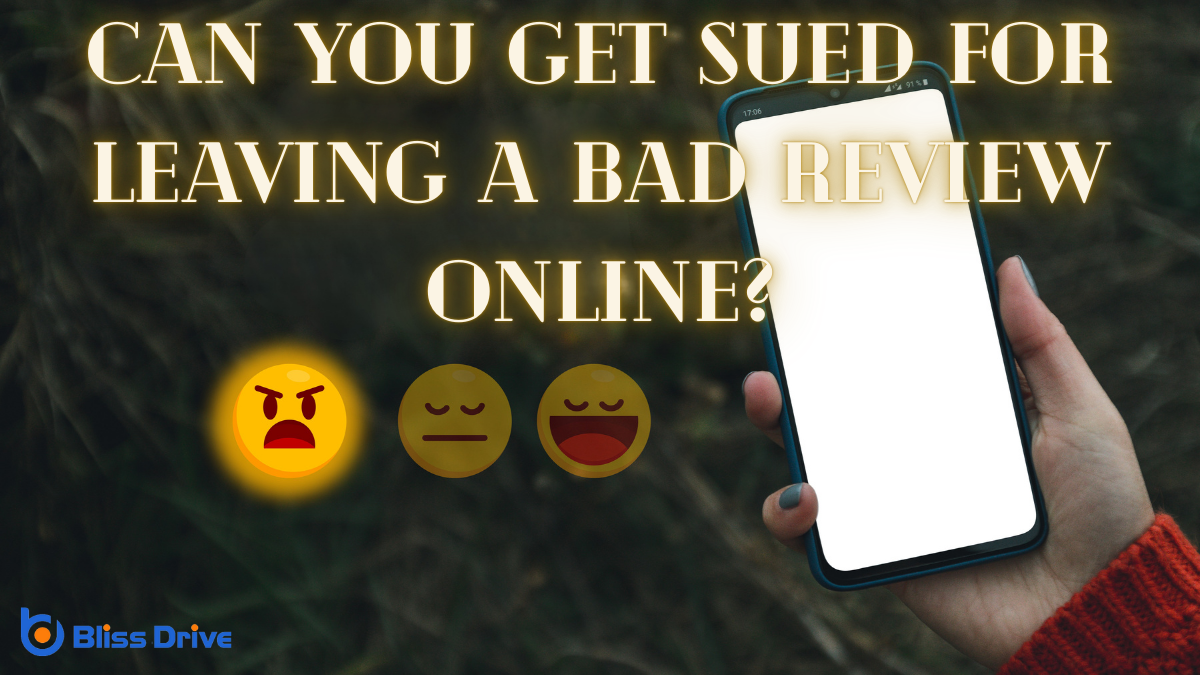Learn More About Us

I've often wondered about the risks involved in leaving a negative review online. Can sharing my honest, albeit harsh, opinion really land me in legal trouble? Defamation laws are a tricky terrain, and understanding the fine line between freedom of speech and potential lawsuits is essential. As we explore this topic, we'll uncover the surprising ways your keyboard could leadA potential customer referred by an affiliate who has shown interest in the product or service but h... you into a courtroom. Curious to know more?
In order to grasp the implications of leaving a bad review online, we need to understand defamation and libel. Defamation refers to false statements that harm someone's reputation. When defamation is written, it's called libel.
Now, I know what you might be thinking: "Can my negative review really be considered libel?" It can, but only if the statement is false and damages the business's reputation. If you stick to truthful experiences and honest opinions, you're generally safe.
However, if you knowingly make false claims, you might face legal consequences. It’s essential to differentiate between sharing your genuine experience and making defamatory statements.
Keeping this in mind helps us responsibly express dissatisfaction without crossing legal boundaries.

While we cherish the right to express our opinions freely, it's important to understand the boundaries of freedom of speech when leaving a review online. Freedom of speech allows us to share thoughts and experiences, but it doesn’t give us the right to say anything without consequence.
It’s vital to remember that this freedom isn't absolute. I must guarantee my reviews are truthful and based on personal experience. When I post, I should focus on facts rather than emotions, avoiding exaggerations or false claims.
Clarity and honesty in my reviews help maintain credibility and respect the rights of others. By being mindful of our words, we can express ourselves while staying within legal and ethical boundaries.
Although I enjoy sharing my opinions online, I must be aware of what might cross the line into defamation when posting a review. Defamation involves making a false statement that harms someone's reputation. To avoid this, I should make sure my review is based on facts and personal experience.
If I claim something negative about a business or person, it’s essential to have evidence backing my statement. Opinions, even harsh ones, are generally protected, but stating something false as a fact isn’t.
I should also steer clear of exaggerations or assumptions. Saying a restaurant gave me food poisoning, without proof, could be risky. Instead, sharing my symptoms factually would be safer.
When looking at legal precedents and notable cases involving online reviews, it's clear that the boundaries of free speech and defamation have been tested in courtrooms.
One case that stands out is Hassell v. Bird, where a California court ruled that Yelp had to remove a defamatory review, even if Yelp wasn't the writer. It demonstrated how platforms could be involved in these legal battles.
Another well-known case is the suit against Andrew and Neely Moldovan by a wedding photographer, which led to a $1 million judgment. They left negative reviews and launched a social media campaignA coordinated marketing effort to reinforce or assist with a business goal using one or more social ..., crossing into defamation.
These cases show that while you can express opinions, exaggerations or false claims can lead to serious legal consequences.

When I write a review, I know it's essential to stick to the truth because false claims can lead to legal trouble.
If I've evidence to back up my statements, it strengthens my position and protects me from potential lawsuits.
Even if you're upset about a bad experience, sticking to the truth in your online reviews is essential.
I've learned that honesty isn't just about being fair; it's also about protecting myself legally. When I share my experiences, I focus on clear, factual details rather than exaggerations or assumptions. This approach not only helps maintain credibility but also shields me from potential legal issues like defamation claims.
I know it's tempting to vent frustrations with strong language or embellishments, but doing so can backfire.
Instead, I aim to describe what truly happened. By remaining truthful, I can guarantee my review is both impactful and safe.
Sharing my genuine experience means I don’t just stick to the truth—I back it up with evidence. When I write a review, I guarantee that what I share is supported by verifiable facts.
This approach not only strengthens my credibility but also protects me legally. If I claim a product is defective, I provide photos or receipts. When service disappoints, I reference specific incidents, dates, or communications.
By doing this, I'm not merely voicing an opinion—I’m presenting a case built on concrete details. It’s essential for anyone writing online reviews to remember that facts speak louder than opinions.
Evidence transforms your words from mere assertions into reliable testimony, shielding you from potential legal issues. Always let evidence do the talking.
When I hear about businesses responding to bad reviews, defamation lawsuits often come to mind.
They might also send cease and desist letters, attempting to scare reviewers into removing negative comments.
It’s vital to understand these legal threats and their potential consequences before posting a review online.
Although your intention might simply be to share an honest opinion, leaving a negative review online can sometimes lead to serious legal consequences, including defamation lawsuits.
When a business believes your statements are false and damaging to their reputation, they might pursue legal action. Defamation involves making false statements that harm someone’s reputation. If a business claims your review fits this description, they might file a lawsuit against you.
To assess if a statement is defamatory, courts consider factors like truthfulness and whether it’s an opinion or presented as a fact.
It’s essential to guarantee your reviews are factual and backed by evidence. Misrepresenting facts or making exaggerated claims could increase your risk of being sued for defamation. Always aim for honesty and accuracy.
If you’ve ever received a cease and desist letter, you know it can be intimidating. These letters are a common tool businesses use to respond to negative reviews they consider harmful or untrue.
The letter typically demands you stop making specific statements, claiming they're damaging and may not be protected by free speech.
The key here is understanding what the letter entails. It's fundamentally a formal request, not an immediate legal action. The business wants you to retract or modify your review to avoid further steps.
You should take it seriously, but it's important to assess whether your review contains factual inaccuracies. Consulting a legal professional can help you determine if the request is justified or if your review is protected by law.
While it's easy to assume your online reviews are protected under free speech, businesses sometimes pursue legal action if they believe a review is defamatory or damaging.
If a company thinks your words have crossed a line, they might issue a legal threat. In some cases, businesses file a defamation lawsuit, claiming your review contains false statements harming their reputation.
I understand this can feel intimidating, but knowing your rights is essential.
Truth is a strong defense in defamation cases; if your review is factual, you have a solid standing. However, exaggerated claims or unverified accusations might weaken your position.
Always verify your reviews are honest and based on personal experience to minimize potential legal consequences.
Facing a lawsuit for leaving a bad review online can have serious implications that extend beyond just legal concerns. You might feel overwhelmed by the financial burden of hiring an attorney and possibly facing court fees.
Even if you win, the stress and time consumption could be significant. The lawsuit might also affect your personal life, leading to anxiety or sleepless nights thinking about the potential outcome.
Additionally, your reputation could be at stake. Public records of a lawsuit might impact your professional life, especially if your job requires a clean record.
It's essential to weigh these factors before posting that review. Understanding that your words have power and consequences will help you navigate the digital world more responsibly and confidently.

Understanding the potential consequences of a lawsuit underscores the significance of crafting reviews thoughtfully. When I write a review, I focus on being clear and fair.
I start by describing my experience factually, avoiding overly emotional language. Instead of saying, "It was terrible," I detail specific issues, like long wait times or unhelpful staff. I also balance criticism with positives, if there are any, to show fairness.
Using "I" statements, such as "I felt" or "I experienced," helps me express my perspective without making unfounded claims. It’s essential to stick to facts and personal experiences, steering clear of assumptions about the business’s intentions.
When posting a review online, I know it's essential to understand the risks of defamation and libel, as these can lead to legal trouble.
To protect myself, I consider using anonymous posting, which can offerThe specific product or service being promoted by affiliates. some privacy benefits.
It's important to be informed about the legal implications to guarantee I'm expressing my opinion safely.
Leaving a negative review online might feel like simply sharing your honest opinion, but it can sometimes lead to legal trouble if not done carefully.
Defamation and libel are key risks to be aware of. Defamation involves making false statements that harm someone's reputation, while libel is the written form of defamation.
To protect yourself, guarantee your review is truthful and based on your personal experience. Avoid exaggerated claims or assumptions about motives. Stick to facts and provide evidence when possible.
For example, instead of saying, "They are thieves," describe specific issues you faced. Remember, opinions are generally protected, but false statements are not.
While ensuring the truthfulness of your online reviews reduces legal risks, anonymity offers another layer of protection. By posting anonymously, you can voice your honest opinions without fear of direct retaliation or legal action. It’s a way to shield your identity, especially when you’re critiquing powerful businesses that might try to silence you.
To post anonymously, consider using platforms that protect your privacy or tools like VPNs to mask your IP address.
Be mindful, though; anonymity isn’t an excuse to spread false information. Truth is still your best defense against lawsuits. Remember, even when anonymous, your words can be traced back if serious legal issues arise.
Use anonymity wisely, focusing on honest and factual reviews to maintain credibility and integrity.
As we look to the future of online reviews, it's clear that legal trends will continue to shape how we express our opinions online.
I think about how laws are adapting to balance free speech with protection against defamation. As more cases arise, courts will likely refine what constitutes a fair review versus a harmful one.
Businesses might push for stricter regulations to protect reputations, but consumers will demand their right to honest feedback.
As a reviewer, I need to stay informed about these changes to guarantee my reviews are both honest and legally sound.
It's important to remember that while we've the right to share our experiences, we must do so responsibly.
The evolving legal landscape will guide this balance.
As someone who's navigated the world of online reviews, I can't stress enough how essential it is to tread carefully. While freedom of speech is our right, it doesn’t shield us from the consequences of defamation. Always base your reviews on verifiable facts and personal experiences. By doing so, you'll avoid legal pitfalls and contribute constructively to the community. Remember, honesty not only protects you but also fosters trust and transparency in the digital world.
